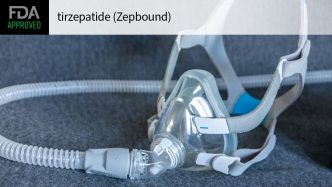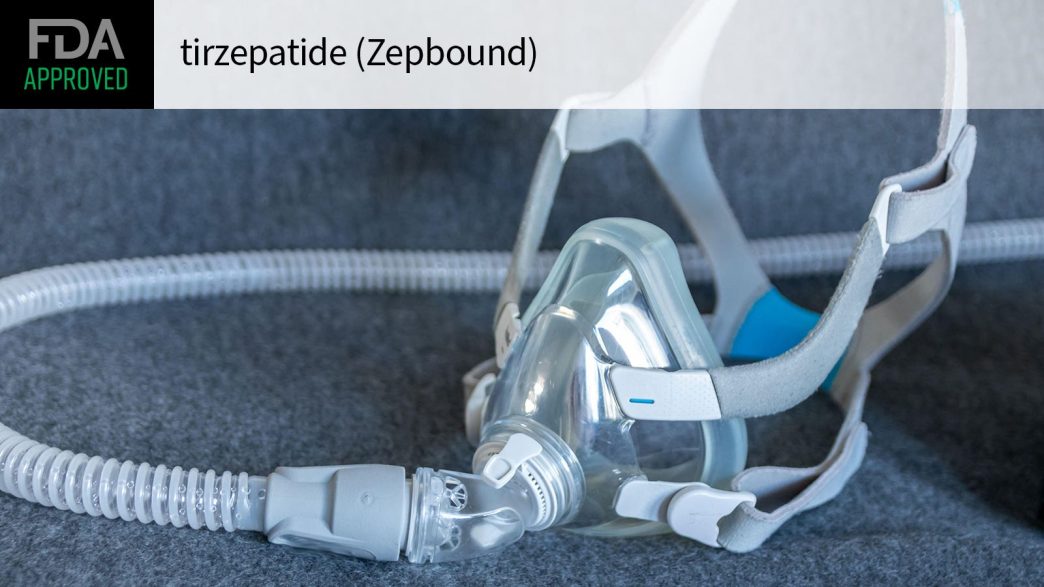—
Tirzepatide ok’d for obstructive sleep apnea in people with obesity
by
Kristen Monaco, Senior Staff Writer, MedPage Today
December 20, 2024
The FDA approved tirzepatide (Zepbound) for adults with moderate-to-severe obstructive sleep apnea (OSA) and obesity, the agency announced late Friday.
Used along with diet and exercise, this marks the first and only prescription medicine for OSA.
“Today’s approval marks the first drug treatment option for certain patients with obstructive sleep apnea,” said Sally Seymour, MD, director of the Division of Pulmonology, Allergy, and Critical Care in the FDA’s Center for Drug Evaluation and Research, in a statement. “This is a major step forward for patients with obstructive sleep apnea.”
Underpinning the approval were two phase III SURMOUNT OSA randomized trials of 469 adults without type 2 diabetes — one in patients using positive airway pressure (PAP), and one of participants unable or unwilling to use PAP.
By week 52, those not on PAP (trial 1) had a mean change at week 52 in the apnea-hypopnea index (AHI) of 25.3 fewer events per hour with tirzepatide in a modified intent-to-treat population versus 5.3 fewer with placebo. For those on PAP (trial 2), tirzepatide led to an average 29.3 fewer AHI events versus 5.5 fewer with placebo.
Nearly 43% and 49% of patients in trials 1 and 2 had a 50% or greater reduction in AHI compared with placebo, respectively.
Tirzepatide, which already holds indications for type 2 diabetes (Mounjaro) and chronic weight management, led to body weight reductions of 18% (45 lb) and 20% (50 lbs) in trials 1 and 2, respectively.
“The improvement in AHI in participants with OSA is likely related to body weight reduction with Zepbound,” the FDA stated.
Side effects associated with tirzepatide are most commonly gastrointestinal-related, and include nausea, diarrhea, vomiting, constipation, abdominal discomfort and pain, injection site reactions, fatigue, hypersensitivity reactions, burping, hair loss, and gastroesophageal reflux disease.
On its label, tirzepatide carries a boxed warning about thyroid C-cell tumors caused in rats. The treatment is contraindicated in patients with a personal or family history of medullary thyroid carcinoma or in patients with multiple endocrine neoplasia syndrome type 2.
The once-weekly injectable dosage recommended for OSA is 10 or 15 mg.
“Too often, OSA is brushed off as ‘just snoring’ — but it’s far more than that,” said Julie Flygare, JD, president and CEO of Project Sleep, in a news release from drugmaker Eli Lilly. “It’s important to understand OSA symptoms and know that treatments are available, including new options like Zepbound. We hope this will spark more meaningful conversations between patients and health care providers and ultimately lead to better health outcomes.”
-
![author['full_name']](https://clf1.medpagetoday.com/media/images/author/kristenMonaco_188.jpg)
Kristen Monaco is a senior staff writer, focusing on endocrinology, psychiatry, and nephrology news. Based out of the New York City office, she’s worked at the company since 2015.














